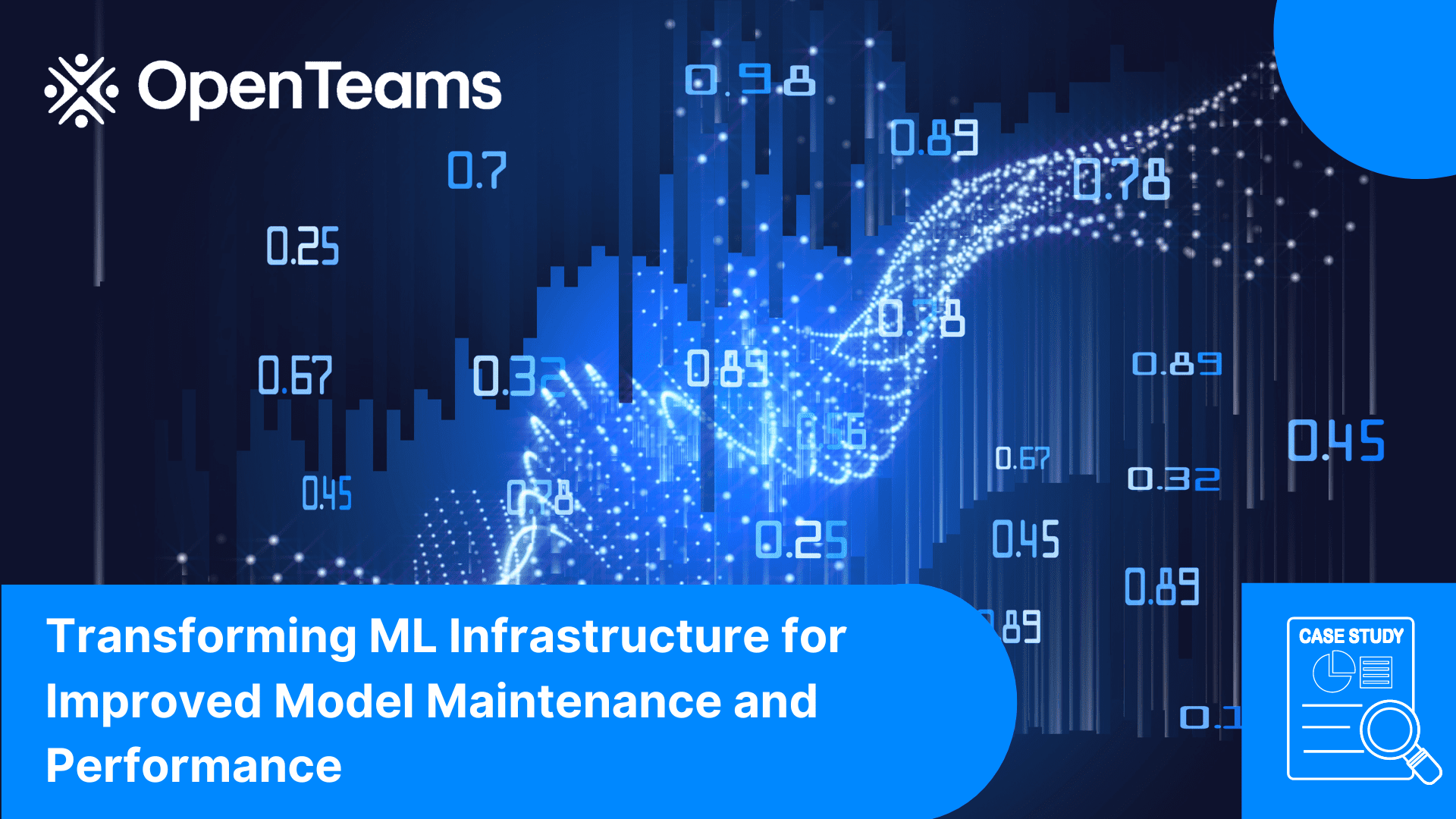Transforming ML Infrastructure for Improved Model Maintenance and Performance

- Model Regressions: The company experienced frequent instances of model regressions, where previously well-performing models would exhibit a decline in accuracy or effectiveness over time.
- Poor Observability: Limited visibility into the models’ behavior and performance made it difficult to identify issues promptly and efficiently. This hindered the team’s ability to proactively address problems and ensure optimal model performance.
- Limited Velocity: The company faced difficulties in maintaining a high velocity of model development, deployment, and iteration due to the complexity of their existing infrastructure.
- Assessment and Requirements Gathering: Hamel collaborated closely with stakeholders, including data scientists, ML engineers, and DevOps teams, to understand the pain points, gather requirements, and define the desired outcomes.
- Architecture Design: Leveraging his expertise in ML infrastructure, Hamel designed an end-to-end solution encompassing training, serving, development, evaluation, and observability components. The architecture involved the integration of various tools and technologies, including:
- PyTorch: A popular open-source ML framework known for its flexibility and scalability.
- Docker: Containerization technology to ensure consistent and reproducible environments for model development and deployment.
- Metaflow: A workflow automation framework that simplifies the ML development lifecycle.
- Airflow: A platform for orchestrating and managing ML workflows, ensuring better automation and reproducibility.
- Kubernetes: A container orchestration platform for
efficient deployment and scalability of ML models. - AzureML: A cloud-based ML platform providing capabilities for training, deployment, and management of ML models.
- Nvidia Triton: An optimized inference serving platform for high-performance deployment of ML models.
- PyTorch: A popular open-source ML framework known for its flexibility and scalability.
- Implementation and Integration: Hamel led the implementation of the proposed infrastructure, working closely with the engineering and DevOps teams. This involved setting up the necessary environments, configuring tools, establishing CI/CD pipelines, and integrating the various components into a cohesive system.
- Testing and Validation: Rigorous testing was conducted to ensure the reliability, scalability, and performance of the new ML infrastructure. Different scenarios were simulated, including model training, serving, and observability, to validate the system’s capabilities and identify any potential bottlenecks.
Results
- Model Downtime, Drift, and Errors Decreased: The new infrastructure effectively mitigated model downtime, drift, and errors, leading to a reduction of 40% in these issues. The improved observability and automated workflows enabled proactive monitoring, faster detection of anomalies, and prompt remediation.
- Enhanced Development Velocity: The revamped infrastructure streamlined the ML development process, enabling faster iteration cycles and quicker deployment of models. The integration of tools like Metaflow, Airflow, and Kubernetes improved collaboration and automation, resulting in increased velocity and efficiency.
- Improved Observability and Monitoring: The new infrastructure provided enhanced observability into the models’ behavior, performance, and data drift. This facilitated early detection of issues and enabled the team to take corrective actions promptly. The combination of AzureML, Nvidia Triton, and customized monitoring solutions enabled comprehensive model tracking and performance monitoring.
Conclusion
Through the leadership and expertise of Hamel Husain, the large tech company successfully overcame their ML model maintenance challenges. By implementing an end-to-end ML infrastructure, leveraging PyTorch, Docker, Metaflow, Airflow, Kubernetes, AzureML, and Nvidia Triton, the company witnessed a significant reduction in model downtime, drift, and errors. The improved observability and velocity empowered the team to deliver higher-quality models with greater efficiency. This case study serves as a testament to the transformative impact of well-designed ML infrastructure on the success of ML deployments in production environments.
About OpenTeams
OpenTeams is a premier provider of open source solutions for businesses worldwide. Our goal is to help organizations optimize their open source technologies through tailored support solutions that meet their unique needs. With over 680+ open source technologies supported, we provide unparalleled expertise and resources to help businesses achieve their goals. Our flexible support plans allow organizations to pay for only what they need, and our team of experienced Open Source Architects is available 24/7/365 to provide top-notch support and guidance. We are committed to fostering a community of innovation and collaboration, and our partner program offers additional opportunities for growth and success.
About Hamel Husain
Hamel Husain is an accomplished Open Source Architect and Partner at OpenTeams, renowned for his expertise in Machine Learning Operations (MLOps) and ML Engineering. With a comprehensive background in software engineering, Hamel has made significant contributions to popular data science tools, including Jupyter, Kubeflow, fast.ai, and Metaflow. His dynamic career spans influential roles at GitHub, Airbnb, DataRobot, and Outerbounds, where he has pioneered solutions in applied ML, growth marketing, and large language models. Hamel’s extensive experience in technology and management consulting, coupled with his exceptional communication skills showcased through his blog and speaking engagements, further enrich his ability to deliver pragmatic and modern solutions for clients. With a deep understanding of operationalizing ML models, infrastructure optimization, and leveraging large language models, Hamel is a sought-after professional who consistently drives success in the field of machine learning and data science.
Unlock the power of open source for your business today
OpenTeams provides businesses with access to a team of experienced open source professionals who can help them unlock the power of open source technologies, delivering customized solutions tailored to their specific needs and goals. Get in touch with us today to learn how we can help you leverage open source to achieve your business objectives.
